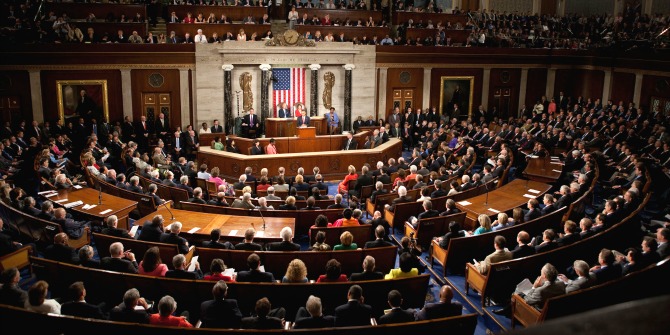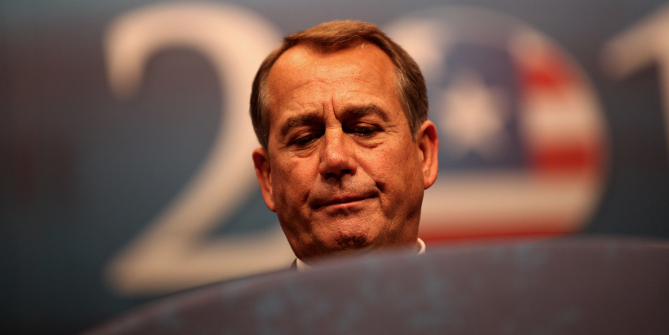USAPP Managing Editor, Chris Gilson looks at the best of the week’s political blogging from academics and think-tanks. Don’t see a blog referenced here that you think we should be reading? Let us know what we’ve missed out and we’ll try to include it next week.
Jump to
[one_half last=”no”]
President Trump and the Republican Party
The Democratic Party
The House and Senate
Elections and American democracy
[/one_half][one_half last=”yes”]
The Government, Beltway and the Supreme Court
Foreign policy, defense and trade
Obamacare and health policy
The economy and society
[/one_half]
President Trump and the Republican Party
On Tuesday this week, Smart Politics writes that Donald Trump has entered office with the most collective experience (over 30 years) of living ex-presidents available to him. There are five living ex-presidents, for just the fourth time in US history.
Angry Bear this week looks at one measure to determine if a president is a success or not – whether or not his opposition later tries to claim some or all of the credit for their achievements, or quietly accepted them as part of the status quo. Speaking of presidential success, FiveThirtyEight discusses what really matters from Trump’s first three weeks in the White House – one of the things we should be focusing on is Trump’s attacks on the Court system, and how he thinks they should be blamed if and when the next terrorist attack occurs. Monkey Cage meanwhile looks at how low the new president’s approval rating can go; it’s now at a net level of -7, and chances are that it will continue to fall.
Angry Bear says that new figures which show that Republicans are becoming increasingly confident about the state of the economy show that Trump is solidifying his support. On similar lines, Paul Krugman wonders if there has been a “Trump bubble” in the stock market and concludes that the data shows that the market action has actually been much smaller than the hype. Beat the Press, meanwhile reminds us that “it’s not Donald Trump’s economy yet” and that we’re still seeing the momentum of the Obama presidency. TheMoneyIllusion also talks Trump and the economy, commenting that people are being “way too kind” to the new president given his recent confusion over whether a strong currency is preferable to a weaker one. Vox’s Mischiefs of Faction looks at why Trump has not yet rolled back the 2010 Dodd-Frank Wall Street reform – one big reason is that the Securities and Exchange Commission (which is a central player in the Act) is an independent regulator.
This week the controversy over President Trump’s executive orders restricting immigration from seven Muslim-majority countries continued. ImmigrationProf blog comments that Trump’s immigration orders are ironic given that he campaigned against President Obama’s more modest executive actions. FiveThirtyEight follows this up, writing Wednesday that Trump hasn’t actually rolled back any of President Obama’s executive orders (yet).

On Saturday, American Power comments that up to eight million people could end up being deported under Trump’s immigration order. Later, Duck of Minerva has the news that Trump’s travel ban order (which most Americans apparently oppose, according to Outside the Beltway) has been lifted by the courts, something which vindicates the power of non-violent protests against the new president. A few days later, Monkey Cage argues that we’re likely to see more anti-Trump protests in the coming days, especially now that social media gives people the ability to organize much more quickly and effectively.
Lawyers, Gins & Money this week writes that a place on Donald Trump’s business advisory council should be a liability – as Uber CEO Travis Kalanick seems to have realized. They say that sitting on the council normalizes Trump’s actions, and shows that they are greedy and will work with anyone no matter how vile their rhetoric.
On Monday, Paul Krugman argues that Trump’s policies over the last two weeks have been “incredibly bad”, from the stalled Obamacare replacement plan to delays to Trump’s proposed infrastructure initiatives. On another policy issue – climate change – Monkey Cage comments that the Trump administration won’t be able to entirely roll back past progress, mostly because cities are leading the way on climate change policy and states are generating demand for clean energy.
On Monday, Monkey Cage looks at what four types of American nationalism – ardent nationalists, those who support the ‘American Creed’, the disengaged, and restrictive nationalists – can tell us about Donald Trump voters. On similar lines, Vox’s Mischiefs of Faction discusses what Trump’s rhetoric has been borrowing from the Tea Party.
Moving to the GOP more widely, Outside the Beltway says that some Congressional Republicans are now looking to restrict legal immigration – in line with Trump’s campaign promises.
The Democratic Party
On Monday, Outside the Beltway writes that Democrats are united in their opposition to virtually all of Donald Trump’s remaining cabinet nominees, from Betsy DeVos, Trump’s pick for Secretary of Education, to Tom Price, the nominee to head the Department of Health and Human Services.
If the Democrats are united in the Senate against the GOP, that’s certainly not the case in the House. FiveThirtyEight this week speaks to Henry Cuellar (D-TX) who has actually voted with Trump 75 percent of the time. Cuellar reckons that the party needs to adopt more centrist policies if it is to recapture the House any time in the future. Angry Bear meanwhile comments that despite being fired up, gains for the Democrats in Congress may prove to be elusive next year. It’s not all bad news for the Democrats – Outside the Beltway says that there are signs of a nascent anti-Trump “Tea Party” as angry constituents confront legislators at Town Halls about their concerns over the repeal of Obamacare.
The House and Senate
On Monday, OUPblog argues that the Logan Act – which prohibits private citizens from interfering with US foreign policy – should be repealed. They say that it has rarely been enforce, its constitutionality questioned, and that we now live in an era of instantaneous communication across the globe. On Wednesday, Lawfare calls for another legislative change – the authorization of the use of military force (AUMF) against ISIL. Two years ago, President Obama extended 2001’s AUMF to apply to ISIL, and without a judicial review of the extension, Congress has been able to avoid the responsibility that would come with a new vote. If President Trump, however sends any ISIS detainees to the Guantanamo Bay military prison, then the extended AUMF could face a challenge in the courts.
On Monday, Vox’s Mischiefs of Faction looks at why Congress isn’t doing more to rein in Donald Trump; they know that the new president is popular with the GOP base, so members of Congress are worried about a primary challenge if they’re seen to have opposed him. Duck of Minerva writes this week on one thing Congress is doing – trying to remove Trump advisor, Steve Bannon from the National Security Council (NSC). They say that Congress is trying to close a perceived loophole which means that there is no Senate oversight to appointments to the NSC. Closing it would prevent Trump and future presidents from making overtly political appointments to the Council. ImmigrationProf blog also talks Congress, writing that it has not given President Trump “unfettered discretion” to exclude any group based on their race, nationality or religion, the administration would have to prove that their entry would be “detrimental to the interests of the US”.

Recent weeks have seen congressional legislators’ offices flooded with calls and emails from constituents who are angry about issues like the repeal of Obamacare, and Donald Trump’s immigration executive order. Vox’s Polyarchy writes that Congress has a responsibility to engage with its constituents rather than ignoring calls or even cutting off phone lines.
In the Senate this week, Betsy DeVos’ confirmation was not an easy one for the Trump administration. DeVos barely made it through to her cabinet post as two Republicans joined with all 48 Democrats to oppose her. The 50-50 tie was only broken by the vote of Vice-President, Mike Pence; the first time a Vice-President had made such a vote since 2008. FiveThirtyEight comments that Trump’s cabinet is facing unprecedented opposition, and that the era of uncontested Cabinet confirmations appears to have passed. Ahead of Senate confirmation hearings for Judge Neil Gorsuch’s seat on the Supreme Court, Duck of Minerva has questions that the Senate should ask, including whether or not it’s appropriate for the President to “demean and attempt to subvert the authority of judges who rule against him?”
This week also saw an attempt by Senator Elizabeth Warren (D-MA) to read a letter from Coretta Scott King into the Congressional record during a debate about the nomination of Senator Jeff Sessions as attorney general (R-AL) shut down by Senate GOP leaders. Monkey Cage has three lessons from the GOP’s attempt to prevent Warren from speaking: the Senate majority retains the power and interprets the rules as it sees fit, the fallout shows the limits of the majority, and it also shows the Senate’s uneven enforcement of the rules.
Monkey Cage writes this week that DeVos’ difficult confirmation is a good indication that President Trump is not likely to have an easy time passing a school voucher law (which DeVos supports). Two GOP Senators, Lisa Murkowski of Alaska, and Susan Collins of Maine voted against DeVos and have voted against school vouchers three times in the past, likely because they do not wish to anger teachers’ unions and because there is less school choice in their largely rural states.
Elections and American democracy
On Sunday, The Volokh Conspiracy explains why Donald Trump’s refugee order is unconstitutional; it targets Muslims. They also note that the plenary power of the executive is not as strong as it once was, and that it should be overruled by the Supreme Court. Lawfare this week offers a tip for journalists: look into threats against federal judges after Donald Trump tweeted that the stay against the executive order had been put in place by a judge would “open up the country to potential terrorists”.
On Friday, Monkey Cage ponders if Donald Trump is an authoritarian at heart, but concludes that it may not matter – what’s more important is what happens to the norms and political institutions which make up our present democracy. Lawyers, Guns & Money writes this week on the “everyday banal cruelty of authoritarianism”, referring to the enforcement of the Muslim ban ahead of the Court’s halt, which saw families separated and children and the elderly handcuffed.
Balkinization writes Tuesday on how to tell if the country is in a constitutional crisis: if politicians have announced that they won’t obey the Constitution, the Constitution fails to keep politicians and civil servants from “looming disaster”, and if people refuse to obey the constitution. They say that at the moment is more in a situation of “constitutional hardball” rather than overt crisis. Vox’s Mischiefs of Faction, meanwhile has a “citizen’s guide to panicking”, and warns that past advice to listen to elites when they tell you to stay calm no longer holds.
The Government, Beltway and the Supreme Court
On Tuesday, with Trump’s immigration order very much in mind, Lawfare looks at whether federal Department heads are able to refuse orders from the White House after the head of the Department of Homeland Security, John Kelly, refused an instruction from Steve Bannon to not go ahead with exemptions for green card holders affected by the order. While Department heads may be able to say no to Trump, his recent executive order that no regulation will be able to be introduced without removing two old ones has also empowered the bureaucracy, at least in the form of Rick Mulvaney who he has nominated to head the Office of Management and Budget. Vox’s Mischiefs of Faction says that Mulvaney’s OMB will be able to define what constitutes a “regulation”, thus making him very important in light of Trump’s order.
Turning to the courts, Lawfare makes the case against national injunctions – as we have recently seen in relation to Donald Trump’s immigration order – arguing that not only does the judge’s order bind the defendant everywhere, no matter where the case is heard, it can also prevent the resolution of cases in other parts of the country. Lawyers, Guns & Money writes this week that Trump’s discriminatory statements during the campaign and since he took office should be relevant to the courts when they are considering challenges to his immigration executive order. On Friday, The Volokh Conspiracy examines the 9th Circuit Court’s decision to uphold the stay on Trump’s immigration order, writing that the Court found that the Trump administration’s evidence to justify the order was lacking. After the decision, Donald Trump tweeted “See you in court”:
https://twitter.com/realDonaldTrump/status/829836231802515457
FiveThirtyEight looks at how we got to this point, and at what happens next – ultimately this ends up at the Supreme Court.
Speaking of SCOTUS, Rick Hasen writes on leaked comments from Judge Gorsuch that he was “demoralized” and “disheartened” by the President’s recent attacks on the judiciary, a move which may have been smart politics for the Judge ahead of his Senate hearings.
Foreign policy, defense and trade
On Sunday this week, Duck of Minerva says that Donald Trump is moving away from America’s “sitcom approach” to foreign policy – a doctrine which was focused on building and maintaining relationships, and resolving conflicts that often seem bigger than they are. Political Violence @ a Glance writes that Trump’s diplomatic policy is a transactional one: America will only do something for a country if there is something in it for America. Talking about making deals, Lawfare wonders what Russian President, Vladimir Putin wants from a bargain with Donald Trump. It’s likely to be the lifting of sanctions at least, but it’s hard to see what other terms could be agreed upon between the two leaders for there to be better relations between the two countries.
President Trump has recently signaled that he advocated the expansion of US nuclear arms. But is this something that the public supports? No, writes Monkey Cage: a large, bipartisan majority supports the current non-proliferation treaty.
Turning to trade issues, Beat the Press looks at the recently mooted idea that ending NAFTA would boost productivity growth because it would mean more manufacturers moving factories back to the US but replacing their workers with robots. Lawfare, meanwhile considers what Mexico’s next move might be with reference to the spat with Donald Trump; they could allow Central Americans safe passage to the US-Mexico border, delay US deportations, or speed up the aforementioned death of NAFTA.
Obamacare and health policy
On Wednesday, The Volokh Conspiracy reports on a new poll which shows that more than 1/3rd of Americans are unaware that Obamacare and the Affordable Care Act are actually one and the same thing. Talking of Obamacare, Beat the Press says that the program has actually allowed more than two million people to work part-time, and that this is made up of mostly young parents and older workers who are too young to qualify for Medicare.
The economy, society and criminal justice
On Monday, Noahpinion writes that economics has become more scientific in recent years, and also comments that most economics is not macroeconomics, and that how that term is defined is part of the problem which faces the profession at the moment. Lawyers, Guns & Money reviews the history of “Buy American” campaigns, are part of US history which Trump is evoking with his economic nationalism. They say that it’s smart politics to create industrial employment in the US, but that we should aim for more ethical production which has higher-paying jobs and is climate-savvy, rather than an “America First!” view of manufacturing.
This week, ImmigrationProf blog reminds us that this month is the centennial of the 1917 Immigration Act, which imposed a literacy test on all incoming migrants, and expanded the Chinese exclusion laws to exclude all citizens from an area bordered by Turkey in the west, India in the south and China in the east. On similar lines, Tropics of Meta looks at what we can learn from 1918’s Muslim ban which saw “hostile aliens” from countries including the Ottoman Empire be forced to obtain permits for all departures and entries into the US.
On Wednesday, The Volokh Conspiracy says that Donald Trump’s claim this week that the murder rate in the US is “the highest it’s been in 47 years” is untrue – it was much higher in 1991 and in 1980.
Featured image credit: Public Domain
Please read our comments policy before commenting.
Note: This article gives the views of the author, and not the position of USAPP– American Politics and Policy, nor of the London School of Economics.
Shortened URL for this post: http://bit.ly/2khnfbH





